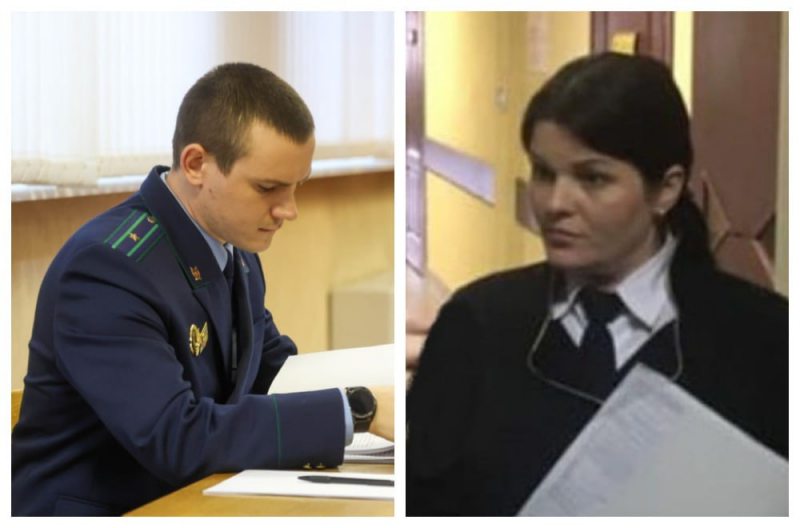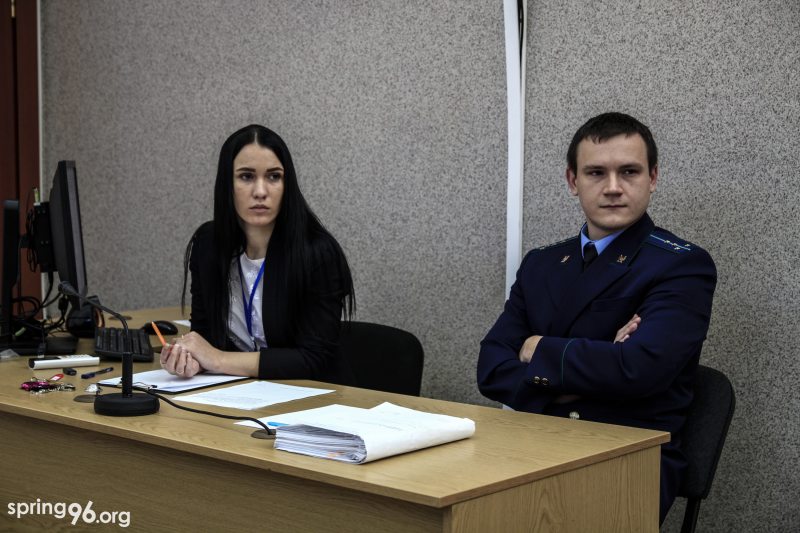Both persecuted artist Ales Pushkin: what is known about prosecutor and judge in Viasna case
Since January 5, the Lieninski District Court of Minsk has been trying the Viasna case. The defendants are Ales Bialiatski, the chairman of the Viasna Human Rights Center and a Nobel laureate, his deputy Valiantsin Stefanovich, the coordinator of the Human Rights Defenders for Free Elections campaign Uladzimir Labkovich, and Zmitser Salauyou, who had to leave Belarus and is being tried in absentia. Judge Maryna Zapasnik is considering the case, and Prosecutor Aliaksandr Karol supports the state prosecution. Zapasnik’s gavel has decided the fate of many well-known public figures, activists, and protesters. Karol has eyewitnessed political prisoners cutting their veins and stomach in the courtroom during ‘political’ trials. This is what is known to Viasna about the prosecutor and the judge in the Viasna case.
Prosecutor Aliaksandr Karol – Regnum case, trials of Dzmitry Paliyenka and Ales Pushkin
Aliaksandr Karol is the senior prosecutor of a department at the General Prosecutor’s Office.
He supported the state prosecution in the case against the authors of the Regnum Russian chauvinist website. Karol demanded to sentence Yuryi Paulavets, Dzmitry Alimkin, and Siarhei Shyptsenka to five years of imprisonment in a penal colony, with a three-year suspension, under Article 130 of the Criminal Code ‘Inciting international enmity’. That was the very verdict the court issued.
In October 2019, Aliaksandr Karol acted as the prosecutor in the case against Dzmitry Paliyenka, an anarchist movement activist. He was to be tried for five episodes under four articles of the Criminal Code behind closed doors. When Paliyenka learned about it, he cut his own veins in protest at the beginning of the court session. After that, the prosecutor dropped the previous accusations under three articles of the Criminal Code, and the trial was made open. Karol asked to sentence Paliyenka to six years of imprisonment. The Minsk City Court sentenced Dzmitry to three years of freedom restriction without being sent to a penal institution.
Karol filed a protest against the mild sentence with the Supreme Court, but later he withdrew it.
According to the information available to Viasna, after the events of 2020, Karol supported the state accusation in only one ‘political’ case–against Ales Pushkin, an artist recognised as a political prisoner. On March 30, 2022, the City Court of Minsk sentenced him to five years of imprisonment in a high-security penal colony under Art. 370 (‘Desecration of state symbols’) and Part 3 of Art. 130 (‘Incitement of racial, national, religious or other social enmity or hate’) of the Criminal Code. The trial was held behind closed doors, but it is known that during one of the court sessions, Ales Pushkin cut his stomach in protest. Besides, Pushkin filed a challenge to the prosecutor Karol. However, he also challenged the judicial panel and even his lawyer. Judge Alena Shylko did not grant his petitions and made the trial closed.
In 2021, Aliaksandr Karol received the Medal for Labor Merits from Lukashenka’s hands.
Judge Maryna Zapasnik – Uladzimir Niakliayeu, Mikalai Statkevich, Ales Pushkin, and 14 ‘political’ sentences after 2020
Maryna Zapasnik is 41 years old, lives in Minsk, and works as the Deputy Chair of the Lieninski District Court of Minsk. She started hearing cases based on ‘political’ police reports in 2011, during the Revolution through Social Networks actions and the ‘silent’ actions. The judge was enthusiastically sentencing all the protesters to 15-10 days of arrest as if on a conveyor.
Similarly to her colleague in the Viasna case, she worked in a case against the artist Ales Pushkin. In 2012, she arrested him for 12 days for an artistic performance: he visited the Supreme Court with a portrait of Rastsislau Lapitski, an anti-Soviet resistance figure. The artist filed a complaint against the decision of the Smarhon District court in that way.
In 2016, she tried the participants of a protest action against the police violence held on January 30, 2016, near the Supreme Court building. She fined Volha Mayorava (now a political prisoner), Anatol Liabedzka, Maksim Viniarski (now a political prisoner), and Uladzimir Niakliayeu. In 2018, she sent Mikalai Statkevich (now a political prisoner) to prison for five days for calling on the Internet to participate in the Memory Chain near the KGB building.
During the protests of 2020, Zapasnik became one of the most repressive judges who judged protesters in a conveyer mode. She arrested for 15 days Illia Sianko, an anarchist movement activist, who reported police violence and bullying, as well as the famous basketball player Alena Leuchanka, who was arrested at the airport when she was about to fly to Greece.
In total, according to the information of the Viasna human rights defenders, for almost ten years, Zapasnik has convicted at least 88 Belarusian men and women based on ‘political’ administrative protocols. In most cases, she would assign administrative arrests: she arrested 46 people for a total of 589 days. She fined 22 people a total of 589 ‘base amounts’ (about USD 8224 as of January 12, 2022).
In November 2020, Zapasnik started working on criminal cases. She handed down the first—and immediately the harshest—sentence to the political prisoners Andrei Khrenkou and Siarhei Ratkevich for the fact that on August 30, 2020, during the Sunday protests, they tried to prevent the arrest of another protester, the political prisoner Aliaksei Charvinski. Zapasnik sentenced each of them to five years of imprisonment in a penal colony.
On December 30, 2020, she sentenced Viktar Aktsistau, a 20-year-old student, to two and a half years in a penal colony. She accused him of violence against a police officer on August 10, 2020, having ignored the fact that he was severely beaten during the arrest on August 10, and his parents could not find him for several days.
Another harsh sentence was handed down in the case of Viktar Barushka, a political prisoner, a businessman who was badly beaten during the protests. After his arrest, he spent 12 days in the intensive care unit of an emergency hospital. At the trial, he claimed that he had been beaten and tortured by law enforcers, but Zapasnik ignored that and sentenced him to five years of imprisonment in an enhanced regime colony.
According to the Viasna Human Rights Center, after the events of 2020, Maryna Zapasnik handed down at least 14 politically motivated sentences in criminal cases.
In July 2021, Zapasnik was included in the sanctions list of the European Union.
And now Zapasnik is judging the Viasna human rights defenders, rejecting their petitions and violating their rights.



















